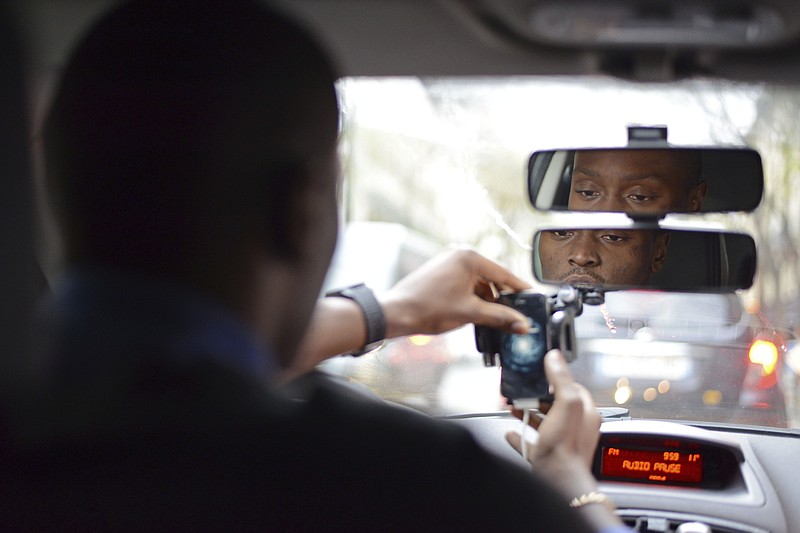 UberPOP driver Anthony Loussala-Dubreas, 24, of Paris, turns on his smartphone in his car in Paris, Friday, Dec. 12, 2014. A French court on Friday ordered Uber to withdraw from its mobile app to French users "all mention suggesting it is legal" for Uber's drivers to act like taxis — that is, driving around and waiting for clients. But the court did not ban the popular ride-hailing service. (AP Photo/Bastien Inzaurralde)
UberPOP driver Anthony Loussala-Dubreas, 24, of Paris, turns on his smartphone in his car in Paris, Friday, Dec. 12, 2014. A French court on Friday ordered Uber to withdraw from its mobile app to French users "all mention suggesting it is legal" for Uber's drivers to act like taxis — that is, driving around and waiting for clients. But the court did not ban the popular ride-hailing service. (AP Photo/Bastien Inzaurralde) Taxi drivers get phone calls, then drive people places for money.
Uber drivers get phone notifications, then drive people places for money.
But the Chattanooga City Council was clear Tuesday: These are two different industries and should be regulated separately.
The City Council passed a first reading of an ordinance to provide some regulatory relief for taxi companies and set some rules for smartphone app-based rideshare companies such as Uber, Lyft and Sidecar. The ordinance also would reorder and rename the city’s Transportation Board, turning it into the Passenger Vehicles for Hire Board.
The ordinance, a merger of two bills written by Councilmen Ken Smith and Chris Anderson, passed 6-2, with one abstention.
Under the proposed law, taxi companies and rideshare networks are both considered “passenger for hire vehicle” companies, but the two services would be regulated under separate areas of city code.
Basically, the city would continue to inspect, certify and permit drivers and regulate fares for six taxi companies. But it would leave rideshare networks to manage most of those responsibilities internally.
The networks would only be required to prove they had followed the rules if the city vehicle board had a complaint or initiated an audit — or if a network driver was involved in an accident.
Taxi fares would still be regulated, but rideshares could charge whatever the passenger agrees to pay before the ride.
Local taxi companies have decried the ordinance, because they feel it strictly regulates their businesses but leaves rideshare networks on the honor system.
The ordinance as passed also leaves disparate requirements for taxi and rideshare drivers.
Potential taxi drivers must pay a $50 application fee and submit to a Tennessee Bureau of Investigation background check and a driving history check. They must have a Class F Tennessee driver’s license endorsement — allowing them to drive a vehicle for hire — or a chauffeur’s license or other license as approved by the city vehicle board.
Under the proposed ordinance, network service drivers need only apply to the company, which would take care of the rest. All they need is a valid driver’s license and clean driving and criminal histories.
Councilmen Moses Freeman and Jerry Mitchell tried to make the rules the same for taxis and transportation networks alike.
Freeman wanted to make ride-share drivers get a Class F license, and he wanted to require city tag stickers and emission papers for ride-share vehicles. Only Yusuf Hakeem agreed.
In four amendments, Mitchell tried to standardize application fees for transportation networks and taxis, and allow taxi companies to internalize vehicle inspections and background checks the same as rideshares. None of his motions got a second.
After the meeting, Smith said he didn’t support any of the amendments, because he thought the merged bill was solid.
“I really feel like with the work and the research that went into this legislation, we have developed a very good bill,” Smith said.
Anderson said he thought Freeman’s suggestions would put burdens on rideshare drivers, who he said were largely part-timers looking to make ends meet.
He said he didn’t support Mitchell’s amendments because this was the first he’d heard of them.
And making taxis responsible for performing their own vehicle inspections and driving and criminal records checks could add cost to the taxis, he said.
“They were sprung on me in the meeting, and no one was able to say if it would increase costs for one group or another,” he said.
The council will vote on a second reading of the ordinance on Jan. 6.
Contact staff writer Louie Brogdon at lbrog don@timesfreepress.com, @glbrogdoniv on Twitter or at 423-757-6481.
